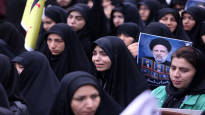When the president of Iran Ebrahim Raisin and the Minister of Foreign Affairs Hossein Amirabdollahian The deaths were confirmed on Monday morning, the media saw people praying in Iran, and on the other hand, there were reports of Iranians celebrating in the West.
Italian professor and analyst of international affairs Raffaele Mauriello has lived in Iran for a total of about 16 years. He teaches at Tehran University.
– In general, people have been surprised. On the other hand, they have also been indifferent because of the economic situation and the recent protests, he says by phone from Tehran.
Mauriello refers to the widespread protests that followed Mahsa Aminin of death at the hands of chastity police in 2022. During the protests, more than 500 people died from police violence, thousands were arrested and eventually seven were executed.
Support for the strict Shiite regime trampling on human rights has been at a record low in recent years, and the conservative Rais could not be considered a popular president by any measure. In the most recent elections, which were held this spring for the members of the Islamic Council, Tehran’s turnout was only seven.
The administration has not allowed more moderate candidates to run for office.
Mauriello still reminds us that people in Tehran are more liberal than in the rest of the country. The president had his supporters in the country, although their number was small.
So there were no people celebrating the president’s death on the streets of Tehran, on the one hand because the administration has a habit of suppressing demonstrations with a heavy hand. But Mauriello sees other reasons for this.
– In Iran, people are generally always sensitive when it comes to death.
At the same time, there is a big gap between Iranians living abroad and Iranians living inside the country.
– Already for economic and social reasons, they do not represent the opinions and views of the entire Iranian people. They represent the diaspora, i.e. the community of people living abroad.
The date of the elections was announced promptly
However, those living abroad have weight because of their large number: over the decades, millions of people have fled the regime, mostly to Western countries. People living abroad have the right to vote in presidential elections.
Iran will hold new presidential elections on June 28.
Raisi’s death has effects on Iranian politics both in the short and long term, says the director of the Iran department of the International Crisis Group, which studies conflicts Ali Vaez.
– This sudden power vacuum may cause increased competition and fighting between hard-line politicians, he says.
That is perhaps why the election day was announced so quickly.
The administration hardly wants to prolong the uncertain situation.
In the country, the highest decision-making power is still not with the president, but with the top leader with Ali Khamenei. According to Vaez, the president still decides on the domestic policy agenda, makes important appointments in the administration and also chooses the tone of voice with which the Islamic Republic speaks to the world.
Raisi, for example, opposed the negotiations with the United States and the EU regarding Iran’s nuclear program. As a result of the negotiations, the sanctions imposed on the country could have been lifted.
Will the more liberals make their voices heard?
The question now is whether the administration will allow even slightly more open-minded candidates to participate in the elections this time.
According to Mauriello, elections are always a big question mark in Iran.
– Will people’s political opinions be represented among the candidates? If this is the case, the voter turnout will also increase, he says.
Especially if a candidate had an answer to people’s financial concerns, interest in the elections would be greater, according to Mauriello.
The answer to this will be received no later than June 11, when the accepted candidates are announced.
However, Vaez estimates that the elections will again be held between ultra-conservatives, and no major changes are expected.
Still, one important point should not be forgotten:
In the longer term, Iran also faces the election of a new supreme leader, as long as time leaves the current leader, Khamenei, who is 85 years old. He has ruled the country since 1989.
The top leader is chosen by the council, which is also elected through elections.
The change of leader will ultimately decide the fate of the entire Islamic Republic, says Vaez.
The supreme leader decides on the country’s foreign policy. Recently, Iran has looked even more towards Russia, China and the Arab countries. The country also recently began normalizing relations with Saudi Arabia.
Security policy challenges
The world’s great fear was that Iran would blame Israel or the United States for the death of the president and the foreign minister, and would complicate the already explosive situation due to the war in Gaza. Israel and the United States are Iran’s arch-enemies, and the country’s regime has supported the Lebanese Hezbollah and Hamas in Gaza. In April, Israel attacked the Iranian consulate in Syria, and attacks between the two countries followed.
Still, Iran does not seem to believe in the possibility of external sabotage, either inside the regime or on the streets.
Mauriello says that conspiracy theories have generally been popular in Iran.
– Now I have not seen such a comment. In general, people consider what happened to be an accident or negligence of safety.
According to Vaez, blaming the enemies would not serve Iran’s interests at the moment.
– This would mean that Iran would have to react somehow. And there is no desire for this now, because the country is already struggling with its own social and economic crises.
